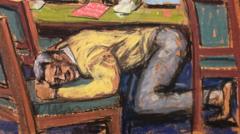Article text:
Georges "Bill" Pallot and Bruno Desnoues, two respected figures in the French antiques community, have been convicted of selling fake 18th Century chairs that they claimed were once owned by famous French royals, including Marie Antoinette. They received four-month prison sentences, along with longer suspended terms and hefty fines of €200,000 and €100,000, respectively. However, since they have already spent their time in pre-trial detention, they will not return to jail.
The ruling followed a comprehensive nine-year investigation that unearthed significant fraud in the antiques sector. The trial, held in a court in Pontoise, north of Paris, focused on the duo's deceptive practices, which landed buyers, including the Palace of Versailles and a member of the Qatari royal family, in a costly trap.
Laurent Kraemer, another defendant accused of negligence regarding the authenticity checks of the chairs sold through his gallery, was acquitted of all charges. His legal team expressed relief at the outcome, stating that the gallery was a victim of the fraud and did not know the chairs were fake.
During the trial, it was disclosed that Pallot was once regarded as a foremost authority on French 18th Century chairs, having published key works on the subject. He leveraged his distinguished position and access to Versailles records to replicate unaccounted-for chairs, working alongside Desnoues, an expert woodworker skilled in cabinetmaking.
Pallot commented on the operation, saying, "It went like a breeze. Everything was fake but the money." Prosecutor Pascal Rayer argued that the case revealed critical flaws in the antiques market, advocating for enhanced regulations to ensure transparency and fairness.
The repercussions of this case extend beyond Pallot and Desnoues. It raises questions about integrity within the antiques industry, a concern echoed by past scandals, including one involving the late Jean Lupu, who allegedly sold counterfeit royal furniture worldwide before his death earlier this year. The revelations surrounding these cases call for a reevaluation of practices within the art and antiques markets in France and beyond.
Georges "Bill" Pallot and Bruno Desnoues, two respected figures in the French antiques community, have been convicted of selling fake 18th Century chairs that they claimed were once owned by famous French royals, including Marie Antoinette. They received four-month prison sentences, along with longer suspended terms and hefty fines of €200,000 and €100,000, respectively. However, since they have already spent their time in pre-trial detention, they will not return to jail.
The ruling followed a comprehensive nine-year investigation that unearthed significant fraud in the antiques sector. The trial, held in a court in Pontoise, north of Paris, focused on the duo's deceptive practices, which landed buyers, including the Palace of Versailles and a member of the Qatari royal family, in a costly trap.
Laurent Kraemer, another defendant accused of negligence regarding the authenticity checks of the chairs sold through his gallery, was acquitted of all charges. His legal team expressed relief at the outcome, stating that the gallery was a victim of the fraud and did not know the chairs were fake.
During the trial, it was disclosed that Pallot was once regarded as a foremost authority on French 18th Century chairs, having published key works on the subject. He leveraged his distinguished position and access to Versailles records to replicate unaccounted-for chairs, working alongside Desnoues, an expert woodworker skilled in cabinetmaking.
Pallot commented on the operation, saying, "It went like a breeze. Everything was fake but the money." Prosecutor Pascal Rayer argued that the case revealed critical flaws in the antiques market, advocating for enhanced regulations to ensure transparency and fairness.
The repercussions of this case extend beyond Pallot and Desnoues. It raises questions about integrity within the antiques industry, a concern echoed by past scandals, including one involving the late Jean Lupu, who allegedly sold counterfeit royal furniture worldwide before his death earlier this year. The revelations surrounding these cases call for a reevaluation of practices within the art and antiques markets in France and beyond.





















